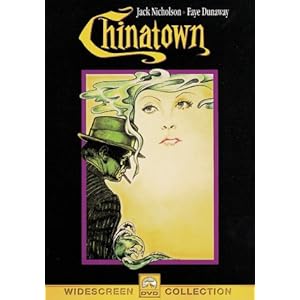
However you feel about what Roman Polanski did, it shouldn't affect your opinion of his work. This is actually the first film of his I've seen, but I was definitely impressed by it, although it might have been more the script and the acting than anything he was in charge of. It was still well-made though, a 70s film noir that definitely lives up to the sensibilities of both. A lot of the style, plot, and content could have easily existed in a film from the original noir movement, but while the setting is in the 40s, a lot of the details aren't. The content is a lot racier, with more violence, vulgarity, sexuality, and a rather infamous twist near the end that certainly would have been too much at the time.
A lot of that is just window dressing though, without which the movie would have still been good just on the strength of the story. A nefarious plot about misappropriated water sounds at first like it might have come from an episode of Captain Planet, but it's really an interesting case, and Jack Nicholson's investigation style makes the whole thing into quite the intriguing caper. There's something about his cynicism and world-weariness that makes him seem a bit more human than the average private dick, and just when he starts caring again the world can't help but beat him back down. Good supporting cast too, Faye Dunaway plays the whole femme fatale thing in a way you'd expect from the 70s, and John Huston shows directing isn't his only skill as her rich and enterprising father.
The script is stuffed with great lines and clever stuff for Jack to do, and deserved its Oscar as much as any screenplay usually can. Hard to say why the ending is so great without explaining it, so I'll just say that the movie builds perfectly to a brutal crescendo that fits exactly what it should be based on everything that came before. Even characters that seemed made to disappear early in the film come back in appropriate roles for the conclusion. It's really just the pinnacle of well-constructed filmmaking.
AAAAAGGGHHHH
16 years ago


































No comments:
Post a Comment